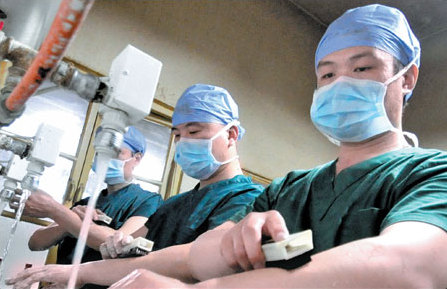Don't call it women's work
Men are entering the nursing profession in greater numbers and gaining acceptance among patients. Liu Zhihua reports.
Ten years ago, if someone would have told Liu Bao that he would become a male nurse, he would have felt insulted.
But today, the 30-year-old from Baoding, Hebei province, has a different attitude and is proud of his chosen career. "I had never heard of male nurses before college," says Liu, who is now a nurse at China-Japan Friendship Hospital in Beijing.
"But now I believe being a male nurse is no more surprising than being a male teacher. If a woman can do the job, why can't a man?"
China has nearly 2.5 million registered nurses, and although male nurses represent about 1 percent of the total, their numbers are growing rapidly, especially in large cities, according to the Chinese Nursing Association.
Xue Lei, a 31-year-old male nurse in Beijing, chose the career at the urging of his father, who said it would be easy for him to find a good job after graduating from college. His father was right, and Xue was hired by Peking University Third Hospital in 2007. He is now the head nurse in the intensive care unit.
"My father works in a hospital, and has seen the demand for male nurses," Xue says. "While women are usually considered gentle and careful, men can also be gentle and careful. Besides, men often are much calmer in emergencies and are physically stronger than most women. That gives us advantages working in fast-paced and high-pressure hospital departments."
Male nurses mostly work in intensive care units, emergency departments, operation rooms and mental hospitals. They are also preferred in examinations involving men's genitals, Xue adds.
Being a nurse in the unit is far more complex than simply giving injections and dispensing medicine. Nurses must regularly wash patients' bodies and help them turn over or change positions.
They also observe and report changes in a patient's condition, and prepare drugs and devices for doctors when they need to perform emergency treatment.
As head nurse, Xue is always prepared to coordinate with medical specialists from all over the hospital, because joint efforts are sometimes needed to treat patients.
Xue loves his job, and he believes nurses can help patients both physically and mentally. Nurses help patients maintain their confidence and happiness while they battle diseases through constant care and attention.
Deng Jun, 27, the head nurse at Peking University First Hospital, says that because there are so few male nurses, they might have more opportunities than their female counterparts in training, overseas business visits and career advancement.
But not every male nurse enters the profession willingly, since many applied at university to be doctors but didn't score high enough on the entrance exam. In fact, many male nursing students choose different careers after graduating, and some leave for other professions after working at a hospital for a year or two.
"Many male nurses are encouraged by other people to be a nurse, and don't make the decision themselves," says Deng, also the deputy director of the male nurse working committee under the Chinese Nursing Association.
"A lot of male nurses quit the job, because nursing doesn't offer satisfaction in terms of salary or social status."
Although nurses receive intensive professional training and some hold a master's or doctorate degree, their salaries are relatively low. For men, who are often supposed to be the main breadwinner of a family in Chinese society, the job is not financially attractive, given the long hours, Deng says.
Another issue is that some people still discriminate against male nurses, and the stereotype that nursing is a feminine profession makes many men feel uncomfortable with the idea of becoming a nurse, Deng adds.
Working in an ICU and emergency and operation rooms doesn't require much communication with patients and their families, and Deng believes that is partly why most male nurses work in those departments.
"Nursing is a job, and it should not be stereotyped with any gender," Deng says. "Both men and women are capable of being a good nurse."
Health authorities have been making efforts to train and employ more male nurses, and the number of registered male nurses has increased from 21,000 in 2010 to 30,000 now.
In April, the male nurse working committee was established under the Chinese Nursing Association to offer male nurses training opportunities, and also to promote a positive image of male nurses among the public.
Chinese people now have an increasing acceptance of male nurses, especially in developed areas, Deng adds.
Liu Bao, the male nurse at China-Japan Friendship Hospital, says at the beginning of his career, it was common for female patients to refuse his treatment and request a female nurse. But now that's no longer the case.
Contact the writer at [email protected].
|
Male nurses clean themselves before going into the operation room at Handan No 2 Hospital in Hebei province. Hao Qunying / For China Daily |

























